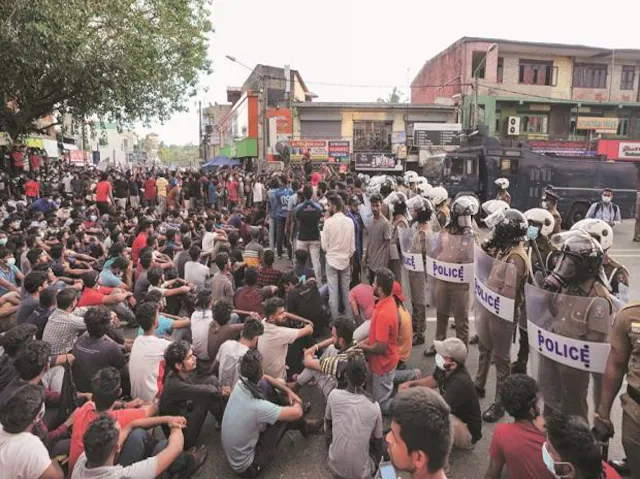Sri Lanka, a flourishing island nation of 22 million, has finally fallen to China’s debt-trap diplomacy.
As Sri Lanka faces its worst economic crisis in decades and struggles to pay loans, China turns a blind eye after ensnaring the island nation into a debt trap.
Sri Lanka is now facing the worst economic crisis since gaining independence in 1948. The recession is attributed to foreign exchange shortages caused by the clampdown on tourism during the COVID-19 pandemic. This has left the country unable to buy enough fuel, with people facing acute scarcity of food and basic necessities, heating fuel and gas.
As the economic crisis took hold of Sri Lanka, India has made a serious effort to bail out its beleaguered neighbour.
Since January, it has helped Sri Lanka with USD 2.4 billion, including a USD 400-million currency swap and a USD 500-million loan deferment. Last month, Sri Lanka signed a USD 1-billion credit line with India for the procurement of food, medicines, and other essential items.
Meanwhile, China has refused to offer any concessions in debt repayment. Total debt to China stands at USD 8 billion, almost one-sixth of Sri Lanka’s total external debt of USD 45 billion, The HK Post reported.
A major problem that Sri Lanka is facing is its huge foreign debt burden, and it owes over USD 5 billion to China alone. Sri Lanka’s foreign reserves are shrinking partly because of construction projects built with Chinese loans that are not making money.
Its dollar-denominated debt repayments due this year total more than USD 6 billion, including a sovereign bond of USD 1 billion maturing in July, according to the think tank European Foundation For South Asian Studies (EFSAS).
There is growing concern among rating agencies and economists that the country would not be able to pay even this, EFSAS adds.
China has reportedly refused to respond to Sri Lanka’s appeal to reschedule its huge debts, and its Ambassador to Sri Lanka said in March that his country was keener on considering a further USD 1 billion loans and USD 1.5 billion credit line.
As a recent report in the Hong Kong Post put it, the end result of reckless borrowing from China to finance unprofitable infrastructure projects was what had contributed to putting Sri Lanka in this unenviable position, to begin with.
The worsening plight of Lankans has sent a loud warning bell in the neighbouring countries like Pakistan where, like Sri Lanka, much of the economic promise is based on Chinese calculations, according to The HK Post.
In another report, the Hong Kong-based publication said the position of Pakistan is the most precarious. The report said Pakistan tops the list of recipient countries of BRI aid, with projects worth USD 27.3 billion.
Similarly, China has snared Pakistan in the BRI debt trap with high-interest rates, stiff repayment terms, and lack of transparency.
Even Bangladesh needs to negotiate carefully before inking any financial agreement, the report adds. From 2009 to 2019, the Dhaka Tribune found that China invested an estimated USD 9.75 billion in transportation projects in Bangladesh.
“While Pakistan is in a difficult position with respect to its indebtedness to China, Bangladesh has been a cautious borrower. Nevertheless as the second-highest recipient of China’s investment in South Asia after Pakistan, Bangladesh which imports the highest volume of goods from China should also be very worried,” the report added.

